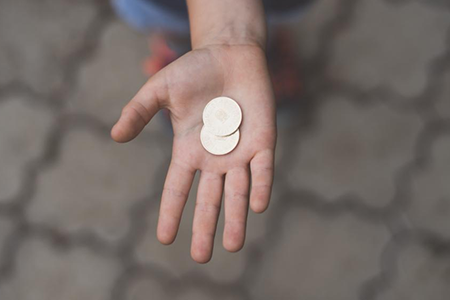The value of financial resilience
By MAS Team | 7 December 2020
Even the most diligent savers among us could still be missing out on financial security without a plan to ensure they are financially resilient.
We all know we should be building up our savings for a rainy day, but never has that advice been more relevant than in 2020.
Across New Zealand, Kiwis face reduced hours or redundancy, an unstable economy and cancelled holiday plans. How well each of us weathers the storm depends on how well prepared we are for the unexpected.
The Commission for Financial Capability (CFFC) ran a survey on changes in New Zealanders’ financial attitudes during the first half of 2020.1 It shows that, in May and June, 31% of respondents had to dip into their savings to pay for basic items, and 24% have missed at least one bill or loan payment.
The CFFC conducted further research in April during the last two weeks of the nationwide level 4 lockdown, which showed that only 26% of households were financially secure – defined as showing no signs of any financial stress with enough money saved to allow for potential changes in circumstance.
On top of this, a staggering 40% had minimal financial resilience, with no reserves to fall back on if their income changed in the coming months. Another 34% were experiencing financial difficulties and were unable to meet their obligations.
 The lessons are clear. According to Hannah McQueen, founder of financial strategy and coaching business enableMe, it’s essential to have a personalised financial plan to maintain – or establish – financial resilience.
The lessons are clear. According to Hannah McQueen, founder of financial strategy and coaching business enableMe, it’s essential to have a personalised financial plan to maintain – or establish – financial resilience.
“People should be spending less, growing wealth and paying down debt – both short-term debt and mortgage debt. That will look different for each household, but these are the goals we need to be focussing on right now,” she says.
“Traditionally, the Kiwi mindset is that everything will work itself out and everything will be okay in the end. This attitude givesus permission to not care about how we drive our finances forward,” Hannah says.
Most younger New Zealanders base their financial approach on the same one used by their grandparents and parents – without acknowledging the huge difference in circumstances between generations. However, the game has changed completely, and the approach we take to our finances needs to change with it.
According to Hannah, Kiwis have traditionally taken a ‘she’ll be right’ approach to saving. Through the middle decades of the 20th century, people could get away with a relaxed approach to their finances because not much planning or strategising was required to achieve your goals. Owning a home and becoming mortgage-free in your 30s was common then, she says.
 “Those financial milestones like owning a home or paying off a mortgage have become so much harder over time. If our grandparents earned $50,000, their mortgage might have been $100,000, and if our parents earned $50,000, their mortgage might have been $200,000. Now on average, if we’re earning $50,000, our mortgages are $500,000. The financial and economic current we swim against has become stronger over time, but the way we approach it hasn’t changed and it’s not working for us.
“Those financial milestones like owning a home or paying off a mortgage have become so much harder over time. If our grandparents earned $50,000, their mortgage might have been $100,000, and if our parents earned $50,000, their mortgage might have been $200,000. Now on average, if we’re earning $50,000, our mortgages are $500,000. The financial and economic current we swim against has become stronger over time, but the way we approach it hasn’t changed and it’s not working for us.
“The financial current used to take you where you wanted to go, without much effort. But we’re currently in a riptide, and we’re being swept in a direction we don’t necessarily want to go. We have to be smarter and we have to use different techniques to get to our desired destination,” she says.
The January to June CFFC survey also showed that many New Zealanders made positive changes in March and April when there was widespread messaging around the need to be prepared for an impending recession, and most households were tightening their belts. However, these changes only lasted for those two months, with most respondents relaxing and reverting to their previous ways after they perceived the initial threat to have passed.
Hannah saw a similar trend in her work, with many people approaching the early days of the lockdown with caution but reverting to their pre-pandemic behaviours within about three months.
“One thing I did notice, however, was that people who were already in a stable financial position realised they needed to put strategies in place to drive their own progress forward and grow their wealth. Previously, it was only people who were quite financially ambitious and risk-inclined who would take this approach.
“Unless people have someone holding them accountable or there’s a fundamental change in their circumstances, they will revert to their old behaviours fairly quickly. Having the right mindset is one thing, but putting systems and strategies in place will determine your rate of progress,” she says.
Hannah encourages Kiwis at all stages of life to take ownership of their financial position and constantly strive to improve it rather than just leaving it to work itself out.
 “You can’t keep using a passive approach. You need a plan, and it needs to be dynamic,” she says.
“You can’t keep using a passive approach. You need a plan, and it needs to be dynamic,” she says.
Hannah recommends every person has a minimum of 12 weeks’ worth of living costs on hand to cover the essentials. It’s best if this is stored in an emergency savings account, or it could be available funds in your revolving credit account that you can access at short notice if you need to.
“Right now, the priorities need to be spending less and not frittering money away, as well as proactively trying to grow wealth. It’s about making your capital work harder. These things might seem obvious, but a lot of Kiwis just don’t do them,” she says.
For those in survival mode with nothing to fall back on, Hannah says the rules have changed dramatically and the advice that applied under normal circumstances has gone out the window.
“If you don’t have any level of financial resilience, you need to make some tactical moves now. You should be most concerned about cash flow and getting your day-to-day costs down and living as lean as possible.
“If you’re able to get by at this base level and move yourself out of survival mode, within six months, you should be in a more stable position and able to start rebuilding yourself to a place of financial resilience,” she says.

1 Commission for Financial Capability: Changes in financial attitudes during and after the first lockdown: Data from the Financial Capability Barometer Survey (January–June 2020)

9 September 2019
Like many of us, you probably take your ability to work and earn a living for granted. But if you were suddenly unable to work for a prolonged period, how easily could you meet your regular financial commitments and maintain your lifestyle?

13 December 2017
Too often, health professionals delay succession planning until they are nearing retirement. A change in mindset should lead to smoother transitions and more successful exits.

25 June 2018
One of the biggest sources of stress for most students is money. For many students, simply making ends meet can be a daily effort. Here are some ideas to become financially stress free!